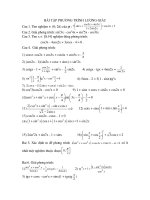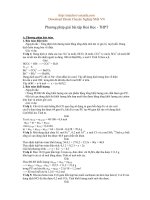Bài tập Reading ôn thi THPTQG
Bạn đang xem bản rút gọn của tài liệu. Xem và tải ngay bản đầy đủ của tài liệu tại đây (99.33 KB, 5 trang )
READING EXERCISE
Exercise 1: Read the following passage and mark the letter A, B, C, or D to
indicate the correct word or phrase that best fits reach of the numbered banks:
A scientist said robots will be more intelligent than human by 2029. The
scientist’s name is Ray Kurzweil. He works for Google as Director of Engineering.
He’s one the world’s leading expert on (1) ______ intelligence (A.I.). Mr Kurzweil
believes computers will be able to learn from experiences, just like humans. He also
thinks they will be able to tell jokes and stories, and even flirt. Kurzweil’s 2029
prediction is a lot sooner than many people thought. The scientist said that in 1999,
may A.I. expert said it would be hundreds of years (2) ______ a computer was more
intelligent than a human. He said that it would not be long before computer (3)
______ is one billion times more powerful than the human brain.
Mr Kurzweil joked that many years ago, people thought he was a little crazy
for predicting computers would be as intelligent as humans. His thinking has stayed
the same but everyone else has changed the way they think. He said: “My view are
not radical any more. I’ve actually stayed (4) ______. It’s the rest of the world that’s
changing its view.” He highlighted examples of high –tech things we use, see or read
about every day. These things make us believe that computers have intelligence. He
said people think differently now: “Because the public has seen things like Siri (the
iPhone’s voice recognition technology) (5) ______ you talk to a computer, they’ve
seen the Google self-driving cars.”
(Source: )
Question 1:
A. Artificial
Question 2:
B. False
C. Handmade
D. Fake
A. While
Question 3:
B. After
C. Then
D. Before
A. Intelligent
Question 4:
B. Intelligently
C. Intelligence
D. Intelligences
A. Consistent
Question 5:
B. Insistent
C. Persistent
D. Resistant
B. Where
C. Whom
D. What
A. Which
Exercise 2: Read the following passage and mark the letter A, B, C, or D to
indicate the correct answer to each of the question.
You have learned about dinosaurs in school. Maybe you have seen them in
museum. But how much do you really know about these animals? Not all dinosaurs
were just big reptiles. For years, scientists thought dinosaurs were big, dumb, and
cold blooded – in other words, just giant reptiles. Some dinosaurs were huge. But
many were about the size of modern – day birds or dogs. Were dinosaurs warm – or
cold blooded? Paleontologists are not sure. But they believe some were intelligent.
Of course, no dinosaur was as smart as a human or even a monkey. However, some
smaller dinosaurs – like the two meter (six- foot) Troodon- had fairly large brains.
Was Tyrannosaurus rex a powerful predator? Some scientists think the
opposite is true. In the movies, T.rex is often a speedy giant, but in fact, this dinosaur
could not run very fast. Physically, it was too large. In reality, T.rex probably moved
as fast as an elephant. Also, T.rex had very small arms. Without strong legs or arms,
this dinosaur probably wasn’t a powerful hunter. It may have been a scavenger
instead, only eating animals that were already dead.
Did an asteroid kill the dinosaurs? An asteroid hit Mexico’s Yucantan
Peninsula about 65 million years ago. It created a 180 – kilometer (110 – mile) wide
crater called Chicxulub. Many believe this asteroid caused extinction of the
dinosaurs. But even before this, dinosaurs were already dying out around the world,
for many reasons. At the end of the Cretaceous period, for example, the global
climate was changing and Earth’s temperature was getting colder.
Dinosaurs completely disappeared about 65 million years ago. However,
scientists believe modern–day birds are descendants of certain dinosaurs. If this true,
then dinosaurs’ relatives are still walking –and flying – among us!
(Source: />Question 6: The best title for this reading could be ________________.
A. What Really killed the Dinosaurs
B. The Facts and Fiction about Dinosaurs
C. Dinosaurs Discovered in Mexico
D. Our Favorite Dinosaurs
Question 7: Which statement about the Troodon is probably TRUE according to
the passage?
A. It was as smart as a monkey
C. It was a huge animal
B. It was warm- blooded
D. It was quite intelligent
Question8: The word “it” in paragraph 2 refer to __________________.
A. A speedy giant
E. A powerful hunter
B. A powerful predator
C. Tyrannosaurus rex
Question 9: According to the passage, at the end of the Cretaceous period
_________.
B. The Earth’s temperature was
changing
C. Humans appeared on Earth
D. Dinosaurs numbers were increasing
in Mexico
Question 10: The word “descendants” in paragraph 4 means _________.
A. Some dinosaurs started to fly
A. Ancestors
B. Phenomena
C. Offspring
D. Scavengers
Exercise 3: Read the following passage and mark the letter A, B, C, or D to
indicate the correct answer to each of the question.
Certain birds are, more often than not, considered bad luck, or even a sign of
impending death. For example, all over the world, both crows and ravens have some
connection to war and death. In early times, crows and ravens were thought to
accompany the gods of war or be signs of gods’ approaching arrival. This idea later
changed. Crows in particular were thought to be harbingers of ill fortune or, in some
cases, guides to the afterlife. Woe be it to the person who saw a single crow or raven
flying overhead, for this was most certainly a portent of death in the near future.
Interestingly, though potentially bad luck for people individually, the raven is
considered to be good luck foe the crown of England. So much so, in fact, that a
“raven master” is, even today, an actual government position in London. He takes
care of the ravens there and also clips their wings, ensuring that these birds can never
fly far from the seat of the British government. This way, the kingdom will never
fall to ill fortune.
Another bird that is thought to play a part in forecasting the fortunes of people is the
swallow. Depending on how and when it is seen, the swallow can be a harbinger of
either good or ill fortune. Perhaps inspired by the swallow’s red- brown breast,
Christian people initially related the swallow to the death of Jesus Christ. Thus,
people who saw a swallow fly though their house considered it a portent of death.
Later, however, farmers began to consider swallows signs of good fortune. Any barn
that has swallows living in it is sure to be blessed in the following year. Farmers also
have to beware of killing a swallow; that would be certain to end any good luck they
might have had.
Though many people think these superstitions are old wives’ tales, there is actually
some evidence to support them. For example, crows and ravens, being scavengers,
appear at the aftermath of battles. Thus, large numbers of crows and ravens could
be good indications of war in an area. As well, swallows feed on insects that can
cause infections in cattle. Thus, a farmer who has many swallows in his barn may
actually have healthier animals on his farm. Therefore, the next time you feel
inclined to laugh at an old wives’ tale, maybe you had better find out if there is any
truth to it first!
(Adapted from Reading Challenge 3 by Casey Malarcher and Andrea Janzen)
Question 11: Which of the following could be the best title of the passage?
A. The crows and their predictions
B. The different beliefs in birds
C. Superstitions about birds
D. Are birds bad lucks?
Question 12: What does the phrase “this idea” in the first paragraph refer to
_______?
A. Crows and ravens have some connection to war and death.
B. Crows and ravens were thought to accompany the gods of war.
C. Certain birds are often considered bad luck.
D. Crows and ravens were thought to be sign of the gods’ departure.
Question 13: The word “portent” in paragraph 1 is closet in meaning to
__________.
A. Augury
B. Suddenness
C. Confidence
D. Conviction
Question 14: According to the passage, which of the following is TRUE about the
ravens?
A. They are driven away by people all over the world.
B. The ravens are taken care of and videoed in England.
C. The ravens are captured near the seats of the British government.
D. The British realm will be fallen to bad chance if there are no ravens nearby.
Question 15: As mentioned I the passage, the swallow originally was considered as
_________.
A. The death of Jesus Christ
C. Crop failure for farmers
B. Good luck for farmers
D. Good blessedness for the following year
Question 16: The word “aftermath” in the last paragraph could be best replaced by
_________.
A. Happiness
B. Consequence
C. Beginning
D. Completion
Question 17: What evidence support the belief in the superstitions mentioned in the
passage?
A. Swallows protect the animals on the farm from contagious pests.
B. The swallows often come at the beginning of a new year.
C. Ravens’ appearance at the end the battle means that the war has stopped.
D. Farmers prefer having swallows to seeing crows in their barns.
Question 18: Which of the following most accurately reflects the author’s
suggestion in the last paragraph?
A.
B.
C.
D.
The old wives’ tales are more often used for fun than the truth.
Although some superstitions are based on reality, people should not believe in them.
People should not make fun of the superstition.
Farmers should protect the swallow to prevent bad lucks.
ANSWER KEY
1. A
7. D
13.A
2. D
8. D
14.D
3. C
9. B
15. A
4. A
10. C
16. B
5. B
11.C
17.A
6. B
12.B
18. C









